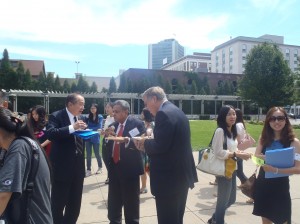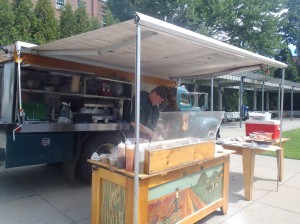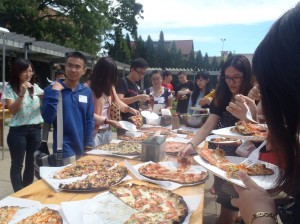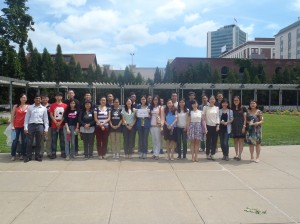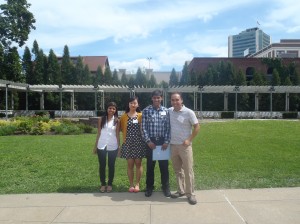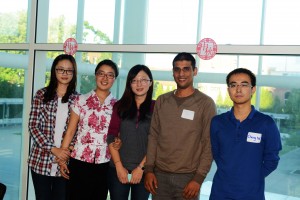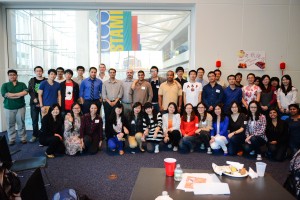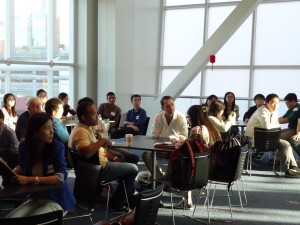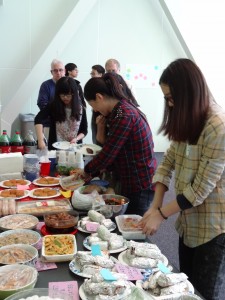From October 9-12, the UConn School of Business hosted students from universities across the globe to participate in a case competition to solve a real-world challenge.
Now in its third year hosting the CIBER Case Challenge competition, the UConn School of Business Center for International Business Education and Research (CIBER) has taken charge in its mission to increase the competitiveness of U.S. business in the global marketplace, as set forth by the U.S. Department of Education. This year’s competition brought together students hailing from 12 different colleges and universities located within the U.S. as well as higher education institutions as far away as Tokyo, Japan.
Kelly Aceto, managing director of the CIBER Case Challenge, led the event, proposing a challenging problem derived from the global business marketplace for which teams of students were required to envision a solution. The problem was kept secret until its official announcement at 9 a.m. on Friday, October 11, at which point the case was distributed. This year’s challenge? To determine if Gillette should bring its Guard razor into the U.S. market. “I have participated in several case competitions, and this one was very different not only because of the international nature of the problem, but also because everyone on our team had a different area of study, whether it was marketing, accounting, operations, or finance,” says Ningwei Li, a finance and economics major at the University of Maryland, College Park, who came in among the top three finalists for “Best Presenter” in the preliminary round. Each team was comprised of four students from four different universities, each studying a different business discipline.
Unlike traditional case competitions, the CIBER Case Challenge tasked students to demonstrate their ability to work in teams consisting of students from varying cultures and nations. Students first met their teammates virtually two weeks before arriving on the Storrs, Connecticut campus. To facilitate greater bonding within teams prior to the case distribution, students traveled to Mystic, Connecticut to participate in a series of team challenges set against the backdrop of Connecticut’s historical seaport. “My team had students from Italy, California, Arizona, and Rhode Island. I’ve never traveled out of the country, so this experience enabled me to make a lot of connections I wouldn’t have made otherwise,” says Joseph Bona, a management major at Bryant University.
On the third day of the event, students presented their case solutions to a panel of judges composed of international business executives from the local tri-state area business community. Presentations were evaluated based on content (60%) and presentation (40%), considering whether the students did their research, logically supported their conclusions, and whether those conclusions would realistically be accepted by management. “They [the presentations] exceeded my expectations,” says Phil Ferrari, CFO at Virginia Industries, Inc., one of the event judges. “The students were intelligent, cohesive, and desirous to do an outstanding job. Quite impressive.”
The evaluations of the judges held serious weight for the student competitors; only three teams advanced to the final round later that day. “It was hard work to differentiate between the groups as they were excellent,” adds Ferrari. “Groups like this will bode well for the future of business in the U.S.”
The finalists were announced at an awards dinner on Saturday evening, where they were presented with plaques acknowledging their accomplishment:
First Place
GianMarco Taverna, University of North Carolina
Ellie Lin, Purdue University
Margaret Wong, Bryant University
Ihinosen Dibua, Pittsburg University
Second Place
Dallin Shaner, Brigham Young University
Nicole Green, University of Connecticut
Sergio Alessandro Castagnetti, University of Trento
Ben Hsieh, University of Maryland
Third Place
Daisuke Honjo, Rikkyo University
Leah Gonzalez, University of North Carolina
Esther Buck, Belmont University
Josh Emmett, University of Connecticut
Best Presenter
Dallin Shaner, Brigham Young University
Best Q&A
Leah Gonzalez, University of North Carolina
“This experience has been amazing,” says Li. “Despite our differences, most, if not all, of the students are like-minded with how we approach school, career, and our aspirations – with an ambitious, positive attitude. That’s how we connected.” he says.
This year marks the first time that two UConn students have placed among the top three teams in the CIBER Case Challenge. “They were well prepared,” says Aceto. “Paul Borochin, assistant professor of finance at the School of Business, spent a lot of time with the students as they got ready to face the challenges of a case competition.”
In an ever-changing international business climate, the United States has public universities like the University of Connecticut to depend on to challenge their own students to work with students of different backgrounds and nationalities. UConn is one of 33 universities nationwide designated as national resource centers for international business, with UConn CIBER in existence since 1995.
For more information:
About CIBER
CIBER Case Challenge
Pictured: One of the student teams, awarded first place for teamwork during their excursion to Mystic, poses in the School of Business atrium: Raaheela Ahmed, finance and economics major at the University of Maryland; Mike Masso, finance major at the UConn School of Business; Mac Bellingrath, marketing major at Belmont University, and Johanna Kuehl, an accounting major at Manchester Business School.
